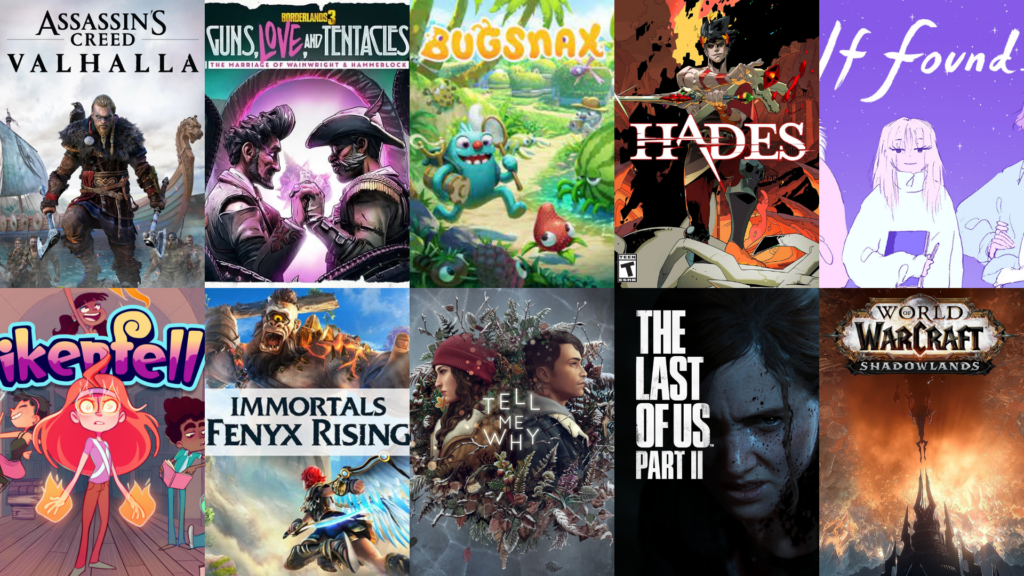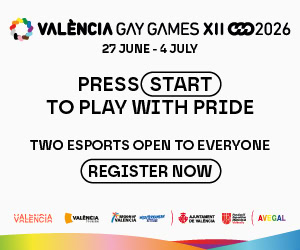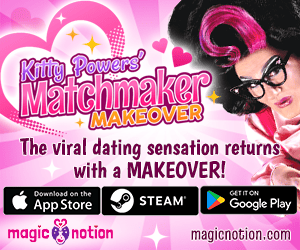
GLAAD Media Awards and how outstanding video games made the cut
In January, GLAAD, the world’s largest lesbian, gay, bisexual, transgender, and queer (LGBTQ) media advocacy organization, announced its nominees for the 32nd Annual GLAAD Media Awards, including its 10 nominees for Outstanding Video Game.
The 32nd Annual GLAAD Media Awards, airing Thursday 8 April, honor media for fair, accurate, and inclusive representations of LGBTQ people and issues. Since its inception in 1990, the GLAAD Media Awards have grown to be the most visible annual LGBTQ awards show in the world, sending powerful messages of acceptance to audiences globally.
“During an unprecedented year of crises and isolation, the nominees for the 32nd Annual GLAAD Media Awards reached LGBTQ people with powerful stories and inspired countless others around the world with bold looks at LGBTQ people and issues,” said GLAAD President & CEO Sarah Kate Ellis.
“As GLAAD continues to lead the fight for LGBTQ acceptance, this year’s nominees remind us that even in times of political and cultural division, diverse LGBTQ representation and visibility can enlighten, entertain, and create lasting change.”
Outstanding Video Game
The nominees for Outstanding Video Game are:
Assassin’s Creed Valhalla (Ubisoft)
Borderlands 3: Guns, Love, and Tentacles (2K Games)
Bugsnax (Young Horses)
Hades (Supergiant Games)
If Found… (Annapurna Interactive)
Ikenfell (Humble Games/Happy Ray Games)
Immortals Fenyx Rising (Ubisoft)
The Last of Us Part II (Sony Interactive Entertainment)
Tell Me Why (Xbox Game Studios)
World of Warcraft: Shadowlands (Blizzard Entertainment)
Read more about each game and its nomination here.
I had the pleasure of talking with Blair Durkee, Special Consultant for Gaming at GLAAD, to understand more about the category and how the nominees made the cut.
Hi Blair, when did the GLAAD Media Awards start recognising video games?
In 2015, GLAAD recognized the game Dragon Age: Inquisition with a Special Recognition Award, and we formalised the Outstanding Video Game category in 2018. We’ve been involved in advocacy work in the gaming space for quite some time, and with the new award category, we wanted to provide an added incentive for the gaming industry to continue making strides in authentic and impactful LGBTQ representation.
The category’s inaugural winner at the 30th Annual GLAAD Media Awards was The Elder Scrolls Online: Summerset, which I personally think is so appropriate and deserved. Massively multiplayer games are where many people find their community and social circles, so it’s especially important that these games are welcoming to LGBTQ players. By making LGBTQ characters an intrinsic part of ESO’s game world, ZeniMax Online Studios went a long way in creating that welcoming environment.
Last year, our winner was The Outer Worlds from Obsidian Entertainment. I know Gayming Magazine has written extensively about this RPG’s incredible portrayal of queer romance and asexuality, so I hardly need to explain how amazing it is!
And now, in 2021, we’re celebrating our biggest and most competitive year yet. We couldn’t be more elated to see the momentum that’s being reflected in the award year after year.
How does a game make your shortlist?
There are four criteria we use to determine nominees and winners: authenticity, boldness, impact, and overall quality.
First and foremost, we evaluate every LGBTQ-inclusive game to ensure that its representation is fair and accurate, not wading into any misleading or harmful tropes or stereotypes.
Second, we take into account how much the game pushes the envelope and contributes something new, both in terms of the type of representation and how it is portrayed. There is a lot of diversity within the LGBTQ community, and it’s important that games show that entire spectrum by featuring LGBTQ characters of all ages, races, genders, abilities, and so on. But how that representation is featured also matters. For instance, many LGBTQ-inclusive games still fall short in terms of marketing, which we think is important, so that’s one area where games can push boundaries.
The third criterion is impact, which is often overlooked and misunderstood. GLAAD’s mission as an organization is to foster acceptance for the LGBTQ community, and the GLAAD Media Awards highlights the ways that media can impact culture and further us toward that goal. In a basic sense, a game’s ability to change the culture is proportional to its reach. But reach doesn’t just mean the number of people who play the game, though of course that’s a primary factor. It could also be the game’s influence on the industry, moving the medium forward and raising the bar for LGBTQ inclusion in future games that will have reach and impact all their own.
Finally, we consider the overall quality—is it a good game? A game that has severe technical flaws, isn’t enjoyable, or lacks broad appeal can detract from the significance of its representation. So while the purpose of the award isn’t to recognize games for their gameplay or artistic merit, we do look for a certain standard of quality to form a basis for the game’s inclusive content.
What’s the aim of the Award? What does it set out to reward?
Everything we do at GLAAD is aimed at accelerating acceptance for the LGBTQ community—not just legal equality, but true lived acceptance. And it’s no secret that the gaming community lags behind in this area. Whether it’s interactions in multiplayer games or on platforms like Discord and Twitch, LGBTQ gamers have to wade through a lot of hatred, harassment, and discrimination. Our singular goal is to change that. We want to create a world where LGBTQ people can play games and participate in gaming communities while being fully accepted for who they are, not having to face those hardships or hide their identities to avoid them. It’s an ambitious goal, but it’s also imperative. This is a problem that can’t simply be moderated away, though of course moderation plays a vital role in the short term. The path to 100% lived acceptance is through changing hearts and minds.
The GLAAD Media Awards highlights the role that media plays in changing hearts and minds. So for the Outstanding Video Game category, the award recognizes games that have a tangible impact on “moving the needle” for acceptance. For non-LGBTQ players, that means showing fair and accurate depictions of LGBTQ characters that cultivate understanding and empathy. For LGBTQ players, that means being able to express yourself and see yourself reflected on the screen. Remember that self-acceptance is a crucial form of acceptance!
Would you want to do more on video game recognition?
Absolutely, we’re always looking for more ways to amplify the work that’s being done to make gaming more welcoming and inclusive. We also work behind the scenes to improve representation in games.
For instance, in 2016, we worked with EA to add transgender characters and character options to The Sims 4. And last year, we worked with Xbox Game Studios on Tell Me Why to bring to life the first playable transgender protagonist in a major studio game.
How are the GLAAD Media Awards adapting to the modern changing entertainment landscape?
Well, the GLAAD Media Awards have been going for 32 years now, so they’ve had to adapt and evolve quite a bit to reflect the progress that’s been made in media.
Our original awards show in 1990 featured a grand total of seven categories, with just a single nominee in most categories. Now, we have 25 categories with as many as ten nominees each.
The landscape is profoundly different, in ways that we couldn’t have even imagined all those years ago. The addition of video games is certainly one of those ways, but another is the proliferation of LGBTQ-inclusive television shows for kids and families, which led us to adding the Outstanding Kids & Family Programming category in 2017.
As media industries shift and grow, we’ll always be evaluating ways to best spotlight the important work that’s being done to accelerate acceptance for the LGBTQ community.
Where can people watch the GLAAD Media Awards?
You can watch the 32nd Annual GLAAD Media Awards on GLAAD’s YouTube channel this Thursday, April 8, at 8pm Eastern Time (5pm PT, 1am UK). If you miss the live show, you’ll also be able to stream it on Hulu starting at 10pm Eastern Time.





